Explore our detailed motor oil guide, your go-to resource for understanding this vital component of your vehicle’s health and performance. Whether you’re a seasoned driver or new to car maintenance, this guide will equip you with the knowledge to confidently select the right motor oil. Ready to dive in? Let’s get started.
Motor oil is the unsung hero of your vehicle’s engine, formulated to perform several vital functions beyond mere lubrication. Understanding its role and importance can significantly enhance your vehicle’s performance, longevity, and overall health.
Motor oil is a thick fluid that lubricates engine parts to minimize friction and wear. Modern motor oils are sophisticated blends of base oils and additives, each selected for their specific properties and benefits. Base oils make up 70-90% of motor oil, providing the fundamental lubricating characteristics. Additives enhance these properties, improving viscosity, cleaning action, and preventing rust.
Motor oil’s primary function is to reduce friction between moving parts, allowing the engine to operate smoothly without overheating. It also helps cool the engine by carrying heat away from critical components. Additionally, motor oil cleans the engine by collecting dust, metal shavings, and other contaminants, transporting them to the oil filter for removal. It protects engine components from rust and corrosion and helps maintain the integrity of engine seals, preventing leaks and performance loss. Furthermore, motor oil cushions engine parts, reducing noise and wear from shock absorption.
Motor oil creates a slick layer between moving parts, reducing friction and helping your engine run smoothly without overheating.
Engines produce significant heat. Motor oil helps dissipate this heat away from vital components, preventing the engine from overheating.
Motor oil picks up dust, metal shavings, and other debris, transporting them to the oil filter to be removed from the system.
It forms a protective coating on engine parts, shielding them from rust and corrosion caused by moisture and other harmful substances.
Motor oil helps maintain the engine’s seals by filling in gaps, preventing leaks and loss of performance.
Motor oil cushions the impact of moving parts, reducing engine noise and wear by absorbing shocks.
Over time, motor oil breaks down and gets contaminated with particles and by-products from combustion, which can damage engine components and reduce efficiency. Regular oil changes are essential to keep your engine running on clean oil, ensuring:
Fresh oil provides optimal lubrication and protection.
Replacing old oil prevents premature wear caused by contaminants.
A well-lubricated engine operates more efficiently, using less fuel.
Clean oil burns more cleanly, lowering engine emissions.
In essence, motor oil is the lifeblood of your engine, crucial for its performance and longevity. Proper maintenance and regular oil changes can save you from costly repairs and keep your vehicle running smoothly for years.

Routine oil changes are more than just a maintenance task; they are an investment in your vehicle’s long-term performance and reliability. Regular oil changes are essential for keeping your vehicle running efficiently, ensuring reliability over the years, and contributing to environmental conservation. By recognizing the importance of this simple yet crucial maintenance task, you are taking a vital step towards responsible vehicle ownership and operation.
Fresh oil provides better lubrication, ensuring engine components work smoothly and reducing the risk of engine failure. New oil also absorbs heat more effectively, maintaining a stable engine temperature and preventing overheating.
Proper lubrication from clean oil means less friction in the engine, requiring less fuel to maintain performance, which can lead to noticeable fuel savings over time.
Changing old, contaminated oil removes abrasive particles and acids that can cause wear and tear on engine parts, significantly extending the engine’s lifespan. High-quality motor oils contain additives that prevent corrosion and rust, protecting internal components from damage.
Clean oil burns more efficiently than dirty oil, leading to lower engine emissions. Regular oil changes also ensure used oil and filters are disposed of properly, preventing environmental contamination.
Many vehicle warranties require regular maintenance, including oil changes, to remain valid. Keeping up with these requirements ensures your warranty stays intact. Additionally, a vehicle with a history of regular oil changes often has a higher resale value, indicating to potential buyers that the car has been well maintained.
Regular oil changes provide an opportunity for professionals to inspect your vehicle and detect potential issues, such as leaks or wear, before they become serious and costly problems.
Selecting the correct motor oil for your vehicle is essential for ensuring engine performance and longevity. Here are the key factors and considerations to guide you in making an informed decision:
Viscosity measures the oil’s resistance to flow. In motor oils, it’s denoted by numbers like 5W-30. The first number followed by “W” (for winter) indicates the oil’s flow at 0°F, reflecting its performance in cold weather. The second number represents the oil’s viscosity at high temperatures (212°F), indicating its ability to resist thinning in heat.
Your vehicle’s owner’s manual will recommend the suitable viscosity for various climates and driving conditions. Adhering to these recommendations is vital for maintaining optimal engine performance and fuel efficiency.
Ideal for light-duty, late-model cars with simple engine designs. It’s the most commonly used type and is suitable for standard driving conditions.
Engineered with advanced lubrication properties, synthetic oil offers superior performance and protection, especially in extreme temperatures. It’s recommended for high-performance and new vehicles.
A mix of conventional and synthetic oils, providing a balance between improved performance and cost-effectiveness. Suitable for SUVs and trucks that carry heavier loads.
Specifically designed for vehicles with over 75,000 miles, it contains additives to protect aging engine components, reduce oil leaks, and lower emissions.
API and ACEA Standards:
Look for oils that meet or exceed the American Petroleum Institute (API) and the European Automobile Manufacturers Association (ACEA) specifications. These standards ensure the oil meets certain baseline quality and performance criteria.
Manufacturer’s Certification:
Some automakers require oils that meet specific OEM (Original Equipment Manufacturer) standards. Using an oil certified by your car’s manufacturer can ensure optimal performance and may be necessary to maintain your warranty.
Detergents:
Help keep engine surfaces clean by preventing deposits.
Antioxidants:
Prevent oil oxidation, which can cause the oil to thicken and form sludge.
Corrosion Inhibitors:
Protect metal components from corrosion caused by moisture.
Friction Modifiers:
Reduce engine friction to improve fuel economy.
Consult Your Mechanic:
If you’re uncertain about the best oil for your vehicle, a professional mechanic can provide recommendations based on your driving habits and the condition of your vehicle.
Be Consistent:
Once you find an oil that works well for your vehicle, sticking with it can help maintain engine stability and performance.
Choosing the right motor oil involves more than just picking a brand off the shelf. It requires an understanding of your vehicle’s needs and the conditions in which it operates. By considering factors such as viscosity, oil type, industry standards, and additives, you can ensure that your engine remains protected, runs efficiently, and performs at its best over the long term.
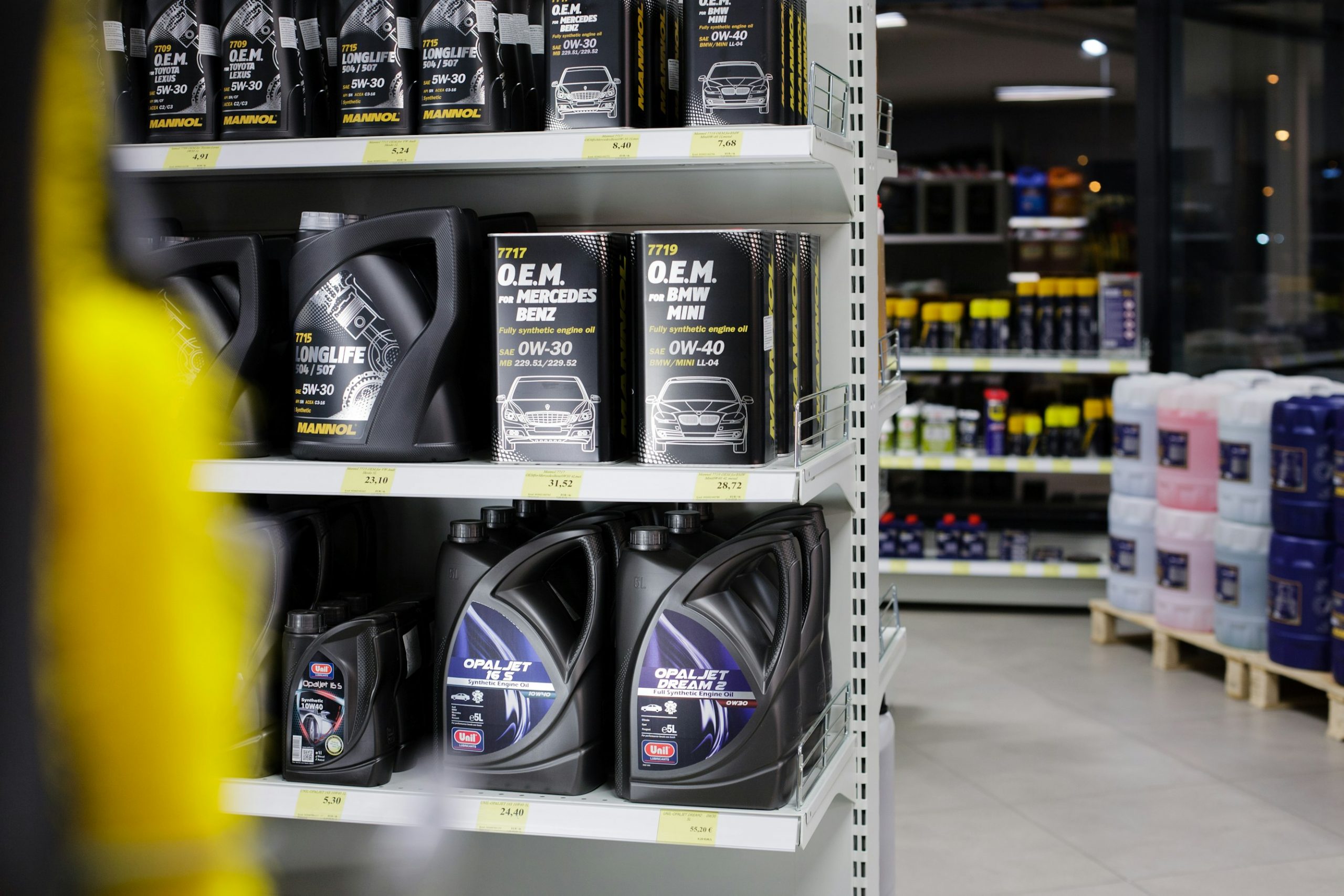
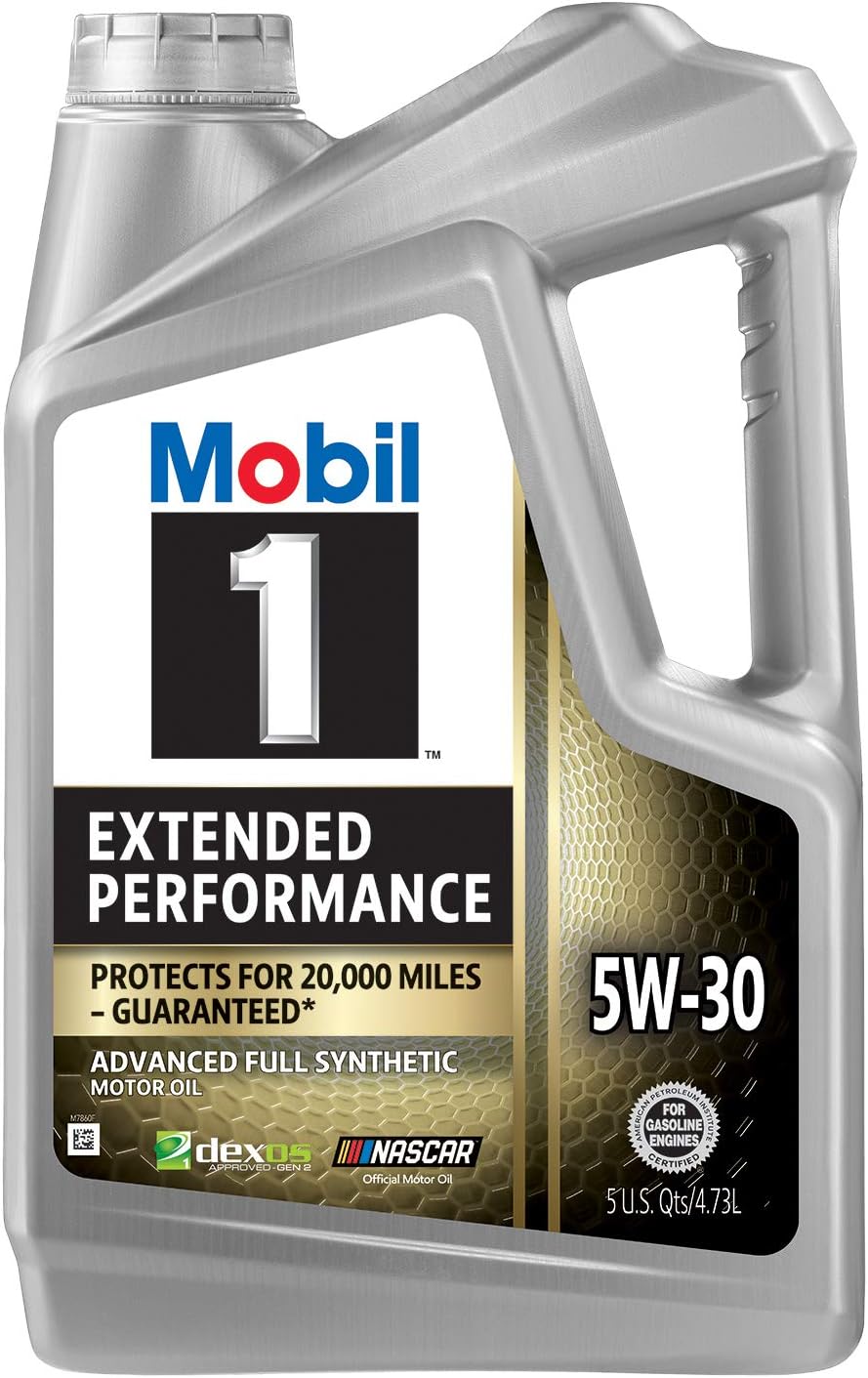
Mobil 1 Extended Performance is a top-tier fully synthetic motor oil crafted to keep your engine running smoothly. It offers outstanding wear protection, powerful cleaning capabilities, and exceptional overall performance. This oil is designed to last up to 20,000 miles between changes, making it a great option for those seeking durability and high performance.
Mobil 1 Extended Performance uses advanced synthetic technology to provide superior thermal and oxidation stability. This helps prevent oil breakdown, keeping your engine cleaner and running more efficiently. Additionally, it meets or exceeds the latest industry standards, making it suitable for a wide array of modern vehicles.
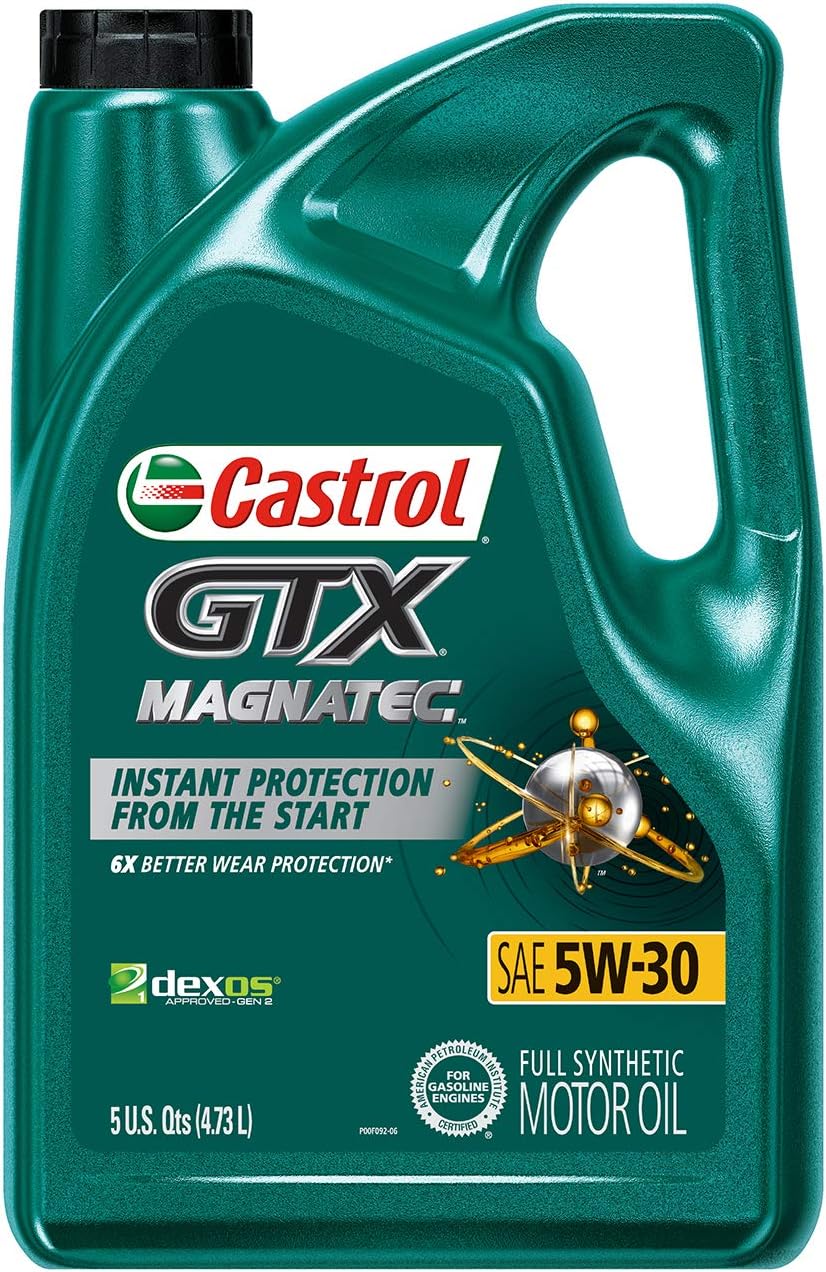
Castrol GTX Magnatec is a synthetic blend oil that adheres to critical engine parts even when the oil has drained, providing immediate protection from the moment you start your engine. This feature significantly reduces engine wear.
The unique formulation of Castrol GTX Magnatec ensures that protective molecules remain attached to engine components even when the engine is off, providing a significant reduction in wear during the critical warm-up period. This oil is particularly beneficial for drivers who frequently start and stop their vehicle.
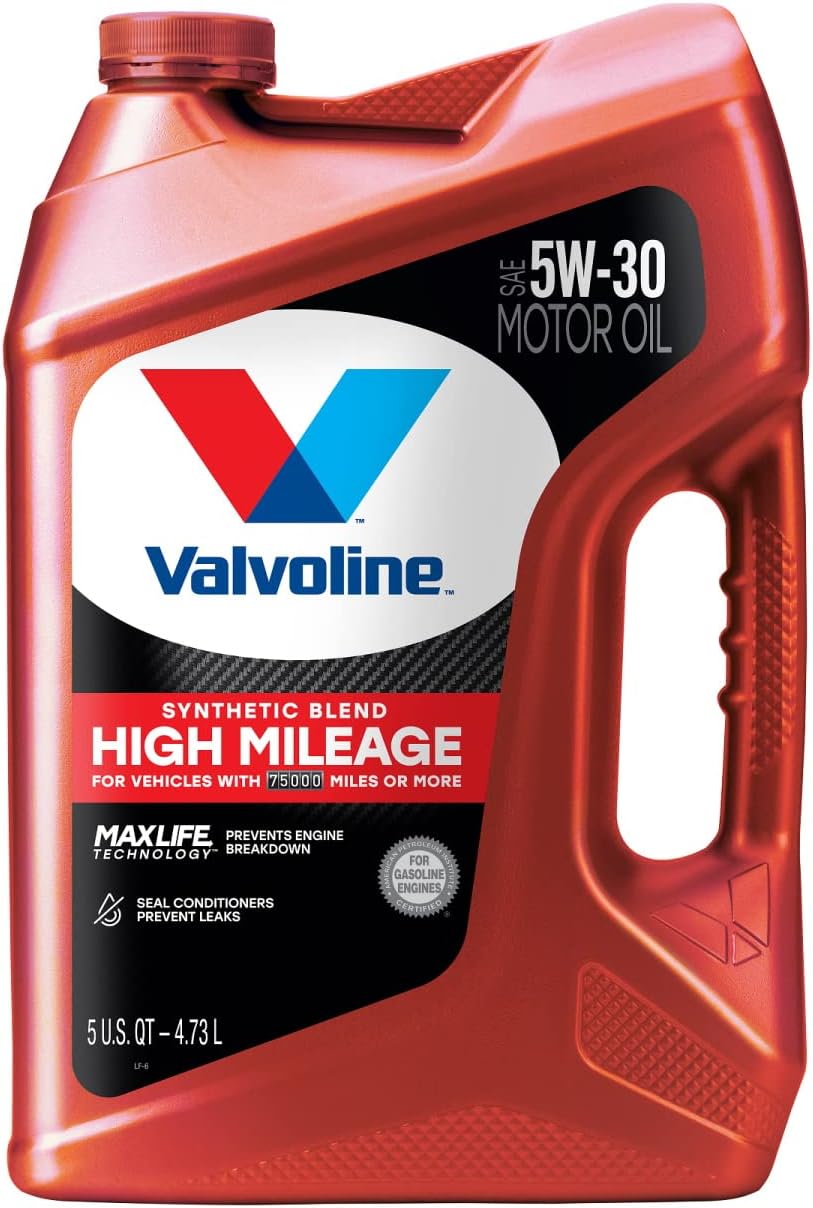
Valvoline High Mileage with MaxLife Technology is specifically designed for vehicles with over 75,000 miles. This oil helps extend the life of aging engines by addressing common high-mileage issues like leaks, consumption, and smoke.
Valvoline High Mileage with MaxLife Technology contains anti-wear additives and friction modifiers that help maintain engine performance. Its special seal conditioners restore the flexibility of seals and gaskets, which helps prevent and reduce oil leaks, making it an excellent choice for older vehicles.
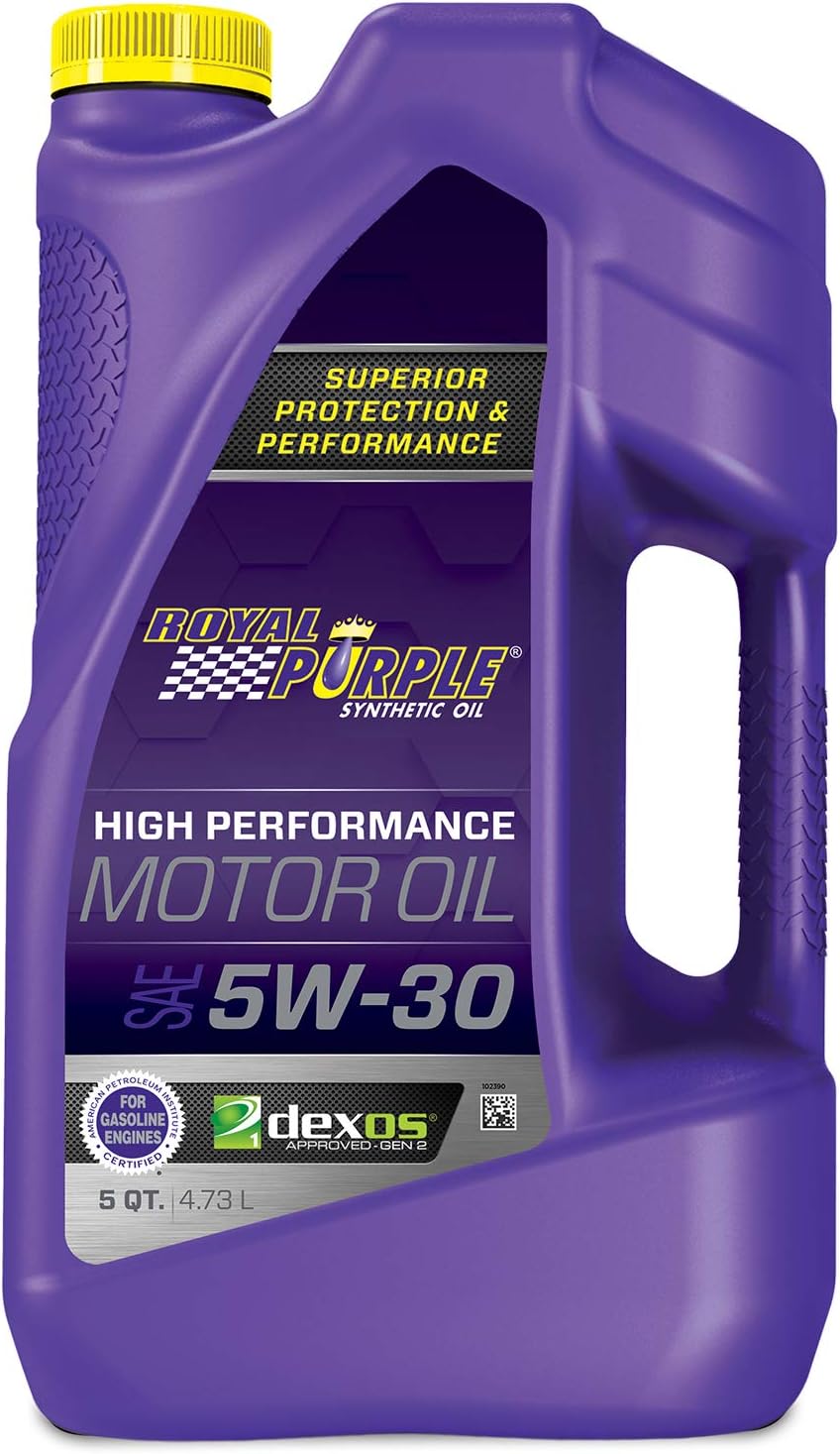
Royal Purple High Performance Synthetic oil is engineered to enhance performance in both gasoline and diesel engines. It provides superior protection and performance across a wide range of temperatures, making it ideal for high-performance vehicles.
Royal Purple’s Synerlec additive technology significantly improves the oil’s film strength, offering unparalleled protection against wear and corrosion. This motor oil also helps reduce engine heat, extending both oil and engine life, and is suitable for those looking to maximize their vehicle’s performance.
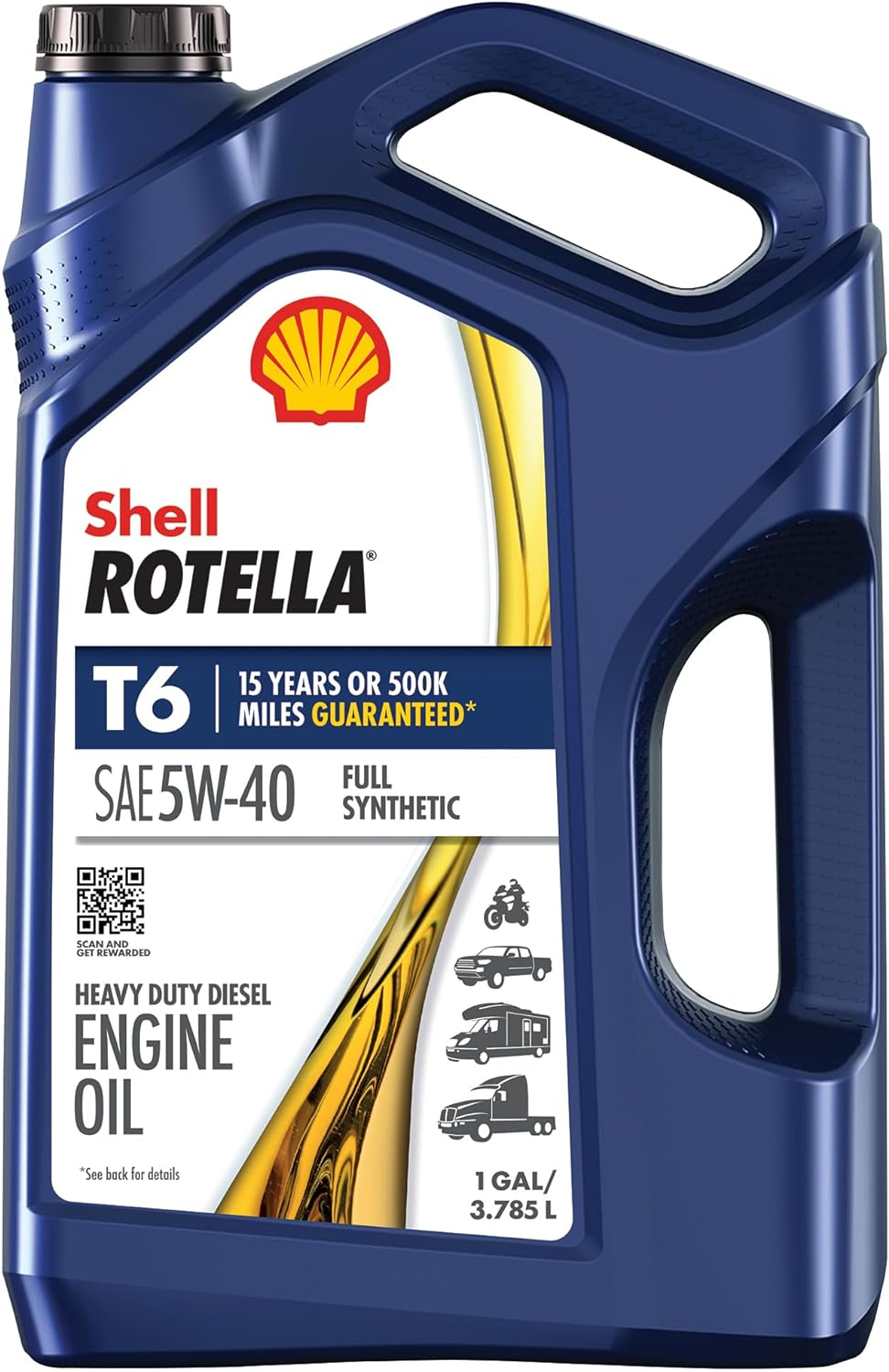
Shell Rotella T6 is specifically formulated for diesel engines, providing excellent protection against wear and deposits. Its advanced additives, combined with synthetic base oils, offer enhanced protection against the harmful effects of soot, dirt, and other contaminants.
Shell Rotella T6 meets or exceeds industry standards for heavy-duty diesel engines, making it ideal for long-haul and severe-service applications. Its superior shear stability maintains optimal viscosity and engine protection under extreme conditions, ensuring reliable performance for your diesel engine.
The recommended interval for changing your motor oil varies depending on several factors such as the type of oil, your vehicle’s make and model, driving conditions, and your driving habits. Typically, conventional oil should be changed every 3,000 to 5,000 miles. Synthetic oils, on the other hand, can last between 7,500 and 15,000 miles, depending on the brand and specific formulation. Always consult your vehicle’s owner’s manual for the manufacturer’s recommendations.
Yes, it is safe to switch between conventional and synthetic oil without causing harm to your engine. However, once you switch to synthetic oil, you might prefer to stick with it due to its superior performance and protective properties. If you decide to switch, ensure a complete oil change to fully replace the old oil type.
Not necessarily. The most suitable oil for your car is the one that meets the specifications listed in your vehicle’s owner’s manual. While synthetic oils are generally more expensive and offer enhanced performance and protection, they may not be required for every vehicle. Assess your vehicle’s needs, driving conditions, and manufacturer recommendations to choose the right oil.
The numbers on a motor oil bottle, such as 5W-30, indicate the oil’s viscosity rating. The first number followed by the letter W (for Winter) shows how the oil flows at 0°F, reflecting its cold-weather performance. The second number represents the oil’s viscosity at 212°F, indicating its resistance to thinning at high temperatures. Lower numbers mean the oil is thinner and better for cold weather, while higher numbers indicate thicker oil, suitable for warmer conditions.
Using the incorrect type of oil can indeed void your warranty if it leads to engine damage that could have been prevented by using the correct oil. Vehicle manufacturers specify oil types and grades for a reason, and not adhering to these specifications could result in denied warranty claims. Always use the oil type specified in your vehicle’s owner’s manual to keep your warranty valid.
Oil grades, such as “conventional,” “synthetic,” and “synthetic blend,” refer to the oil’s formulation and performance characteristics. Conventional oil is derived directly from crude oil with minimal processing. Synthetic oil is chemically engineered to provide superior performance, including better high and low-temperature viscosity performance and enhanced protection against engine wear. Synthetic blend oils are a mix of conventional and synthetic oils, offering a balance between performance and cost.
Motor oil can degrade over time, even if it remains unopened. Most oil manufacturers recommend using motor oil within 4-5 years of the manufacturing date. If stored properly in a sealed container in a cool, dry place, motor oil can last for years. However, it’s always wise to check the oil’s appearance and consistency before use if it has been stored for an extended period.
Used motor oil should never be thrown in the trash, poured down drains, or dumped on the ground as it is harmful to the environment. Many auto parts stores, service centers, and recycling centers accept used motor oil for recycling. It’s crucial to store and transport the used oil in a clean, leak-proof container. Recycling used oil is the most environmentally friendly option, as it can be refined and reused multiple times.

In the world of automotive maintenance, there are numerous myths about motor oil that can lead to unnecessary expenses, wasted resources, and even potential vehicle damage. Let’s clarify some of the most common misconceptions about motor oil:
Debunked: This advice was valid in the past, but advancements in oil and engine technology have significantly extended this interval. Modern vehicles, especially those using synthetic oil, can often go 7,500 to 15,000 miles between oil changes. Always refer to your vehicle’s owner manual for the manufacturer’s recommendations.
Debunked: While fresh oil is typically a clear amber color, it’s normal for oil to darken as it cleans the engine. The best indicators for an oil change are mileage and engine performance, not the color of the oil.
Debunked: This myth originated from the early days of synthetic oil, where certain formulations could cause rubber seals to shrink and leak. Modern synthetic oils are fully compatible with contemporary engine designs and materials, and they do not cause leaks.
Debunked: It is perfectly safe to switch between conventional and synthetic oils as long as the oil meets your vehicle manufacturer’s specifications. Consistency in oil changes is important for maintaining engine health, but switching types does no harm.
Debunked: Topping off your oil does not remove contaminants and degradation products that build up over time. Changing your oil involves replacing it with fresh oil and a new filter, which is essential for protecting and lubricating your engine effectively.
Modern vehicles come with advanced systems designed to monitor the condition of your motor oil and alert you when it’s time for a change. Understanding these indicators can help you maintain your vehicle more effectively.
These systems use algorithms and sensors to track driving conditions, engine temperatures, mileage, and other factors to accurately determine when your oil needs changing. The dashboard indicator is a more reliable guide than the outdated rule of thumb of “every 3,000 miles.”
Calculates oil change intervals based on the number of miles driven.
Adjusts predictions based on high-temperature driving, heavy loads, or frequent stop-and-go driving, all of which can affect oil life.
Monitors engine performance and operating conditions to determine the optimal time for an oil change.
When it’s time for an oil change, your vehicle will alert you with an indicator light or a message on the dashboard display. This is your cue to schedule an oil change soon. Ignoring these indicators can lead to reduced engine performance, increased fuel consumption, and even engine damage.
In addition to relying on your vehicle’s monitoring system, it’s wise to periodically check your oil level and condition manually using the dipstick. This can alert you to potential issues like leaks or excessive consumption before they become serious problems.
By debunking common myths and understanding your vehicle’s oil change indicators, you’re better prepared to maintain your engine’s health, ensuring its longevity and optimal performance. When in doubt, always consult your vehicle’s owner manual or seek advice from a professional mechanic to keep your car running smoothly.
Wollea.com is a participant in the Amazon Services LLC Associates Program, an affiliate advertising program designed to provide a means for sites to earn advertising fees by advertising and linking to Amazon.com. Amazon and the Amazon logo are trademarks of Amazon.com, Inc. or one of its affiliates.
| Cookie | Duration | Description |
|---|---|---|
| cookielawinfo-checbox-analytics | 11 months | This cookie is set by GDPR Cookie Consent plugin. The cookie is used to store the user consent for the cookies in the category "Analytics". |
| cookielawinfo-checbox-functional | 11 months | The cookie is set by GDPR cookie consent to record the user consent for the cookies in the category "Functional". |
| cookielawinfo-checbox-others | 11 months | This cookie is set by GDPR Cookie Consent plugin. The cookie is used to store the user consent for the cookies in the category "Other. |
| cookielawinfo-checkbox-necessary | 11 months | This cookie is set by GDPR Cookie Consent plugin. The cookies is used to store the user consent for the cookies in the category "Necessary". |
| cookielawinfo-checkbox-performance | 11 months | This cookie is set by GDPR Cookie Consent plugin. The cookie is used to store the user consent for the cookies in the category "Performance". |
| viewed_cookie_policy | 11 months | The cookie is set by the GDPR Cookie Consent plugin and is used to store whether or not user has consented to the use of cookies. It does not store any personal data. |